Dave Armstrong's Blog, page 40
March 8, 2012
My Book, 100 Biblical Arguments Against Sola Scriptura to be Released on April 28th
 Todd Aglialoro
Todd AglialoroI was browsing my books on Barnes & Noble to see if some of my recent e-book editions were listed and I ran across this new information. The list price is just $12.95 (great!) and it's 135 pages long. You can pre-order it at Barnes & Noble and also at Amazon.
For much more info. about the book, see my own book page for it.
I'm very excited about this one. It's my first book published by Catholic Answers. We hope to do several more in the future (I met for several hours with Karl Keating, Jimmy Akin, Tim Staples, and others in May, at Catholic Answers' offices in El Cajon, CA). 100 Biblical Arguments . . . was edited by my good friend Todd Aglialoro, who always does an excellent job. He used to be the editor at Sophia Institute Press, and my books The Catholic Verses (2004) and The One-Minute Apologist (2007) were originally his ideas. Now he works for Catholic Answers, so we are able to continue our fruitful working partnership. He was also instrumental in getting my book of quotations, The Wisdom of Mr. Chesterton , published (Saint Benedict Press, 2009).
Many thanks to Todd, Karl, and all the good folks at Catholic Answers: whose work I have admired and learned so much from for over 20 years. I'm honored and privileged (and humbled) to be able to work with them in order to bring more Catholic apologetics books to the public.
* * *
Published on March 08, 2012 09:39
March 2, 2012
Reply to a Calvinist Critique of my Book, The Catholic Verses ("Introduction")
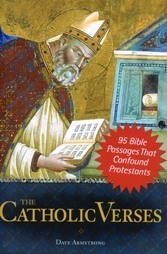
I came across this piece today in a Google search: the same day it was posted (2 March 2012). The article is entitled, Re: Dave Armstrong, The Catholic Verses - Introduction, and is from the blog, Design of Providence , headed by a former Eastern Orthodox, currently Reformed Protestant (Calvinist), whose full name is unknown. His words will be in blue.
* * * * *
A few weekends ago, I was spending time with my good friend Mary. As she's a former Roman Catholic, I decided she might be interested in stopping by a Roman Catholic bookstore in the area. While we were perusing the wares, I came across a book by Dave Armstrong entitled The Catholic Verses: 95 Bible Passages that Confound Protestants. I scanned through until I came across one chapter with a subject of interest, so I read through the whole section. By the end, I suddenly felt a great need to respond, or at the very least provide something like a response.
My kind of guy!
At the behest of others I decided to go ahead and read the whole thing. I ordered it online and received it just a few days ago. With pencil in hand and ready to take notes, I began to read to see if these "95 bible passages" really would "confound" me.
I take it that, thus far, they have not done so. But one never knows how much one may be influenced by reading different perspectives . . . I commend my critic for having the courage to interact with an opposing view by giving a fair read and then responding. And here I am counter-replying. It could turn out to be a constructive ongoing dialogue. I'm delighted about having an opportunity to defend my arguments in this book: one of my "officially" published ones (Sophia Institute Press).
The book is divided not by individual passages, but into sixteen chapters, each about particular subjects. Each chapter is then divided into sections, each with a few verses related to the topic. What I've decided to do is to respond to each individual section in individual posts. This will be a combination of a counterpoint and a continuous book report. As this is the introductory post, it's only fitting that we review the...well...introduction of the book.
Sounds like fun. The Introduction can be read on the info-page for this book.
Strangely enough, the first thing I felt compelled to take notes on was the back cover, which begins with this:
Martin Luther ignited the Protestant Reformation by tacking ninety-five anti-Catholic theses to a church door in Germany. Now Dave Armstrong counters with ninety-five pro-Catholic passages from an authority far greater than Luther: the Bible itself.Whether it was at the suggestion of Dave Armstrong or (more likely) the idea of Sophia Institute Press,
It was the latter, and I wouldn't have used this phraseology in this particular context: partially for the reasons given by my critic. But Luther's theses were 'anti-Catholic" in the sense of generally "opposing current Catholic teachings and practices." Not all of them were technically heterodox, as I understand.
the use of the term "anti-Catholic" completely astounded me. For one, "anti-Catholic" is a phrase used far too easily in certain Roman Catholic circles.
Sometimes, yes. I find that both sides of the debate often have poorly thought-out definitions of the term
It is used so freely that everything from the slanderous lies of Jack Chick to the more reasoned arguments of men like James White or Matt Slick are lumped together. There is a world of difference, however, between someone who is "anti-Catholic" because they spread lies with the intent to badmouth Catholics, and those who are "anti-Catholic" only because their conclusions are opposed to the doctrines and teachings of the Roman Church.
Neither one is the definition that I and most scholars (historians, sociologists, etc.) utilize. It's not referring merely to slanderers and nitwits like Chick (in the sense only of being a liar and misinformed fool or bigot); nor does it refer to mere theological opposition (that occurs internally among Protestants, and indeed among anyone who differs in a theological view with another Christian). The theological / doctrinal definition I use, and that scholars generally utilize, is:
One who believes that ["Roman"] Catholicism is not a species of Christianity and that one can only be saved by being a 'bad ["Roman"] Catholic' and dissenting from several ["Roman"] Catholic dogmas, and cannot be saved if all ["Roman"] Catholic doctrines are accepted in faith.
This is a belief that unites Chick, White, and Slick (I've countered White's arguments dozens of times since 1995, and Slick's a few times): look up their names on my Anti-Catholicism web page. Here are my own many treatments on this important question of definition of terms:
Use of the Term Anti-Catholic in Protestant and Secular Scholarly Works of History and Sociology (vs. "Romans 45")
Dialogue With Baptist Ken Temple About the Equivalence (in Intent and Purpose) of the Terms Anti-Catholic and Anti-Calvinist
The Legitimacy of the Term Anti-Catholic as a Noun as Well as an Adjective
Scholarly Use of the Term Anti-Catholicism in Precisely the Way I Habitually Use It (the Theological or Doctrinal Sense)
The Term Anti-Catholic is Widely Used by Scholars of Many Types -- Including Non-Catholics (Will Anti-Catholics Ever Comprehend This?) [includes listing of related papers on the topic of "anti" terminology]
Defense of Scott and Kimberly Hahn's Use of Anti-Catholic in Their Testimony Book, Rome Sweet Home
Fruitful Discussion With a Protestant About the Definition of Anti-Catholicism, Knowing Jesus Personally, and Constructive Dialogue
Our Friend "Carrie" and the Difference Between a "Protestant" and an "Anti-Catholic (Protestant)"
James White Lies About His Supposed Non-Use of "Anti-" Terminology, and in so Doing Commits Blatant Hypocrisy, Exhibits Serious Log-in-the-Eye Disease
Anti-Catholic vs Anti-Catholicism: Is There an Essential Difference? Turretinfan's and Steve Hays' Double Standards and Equivocation
For another, even a casual review of Luther's 95 Theses (source) shows them to be anything but "anti-Catholic." We must remember that, at this point in Luther's life, he was not criticizing the Roman Church as an institution or their doctrine in toto. Luther was not opposed to the doctrine of papal supremacy, purgatory, and other teachings (though he would be later on).
That's correct. I agree. But he was soon after to massively dissent: to the tune of at least 50 departures by the year 1520: all before he was excommunicated. It's only natural (though not minutely accurate) for Catholics to sort of project onto the 95 theses, Luther's later heterodoxies (from our perspective). In historical matters, things usually get interpreted within the framework or matrix of later developments of the same things.
But for the purposes of this book, it was simply a nice catchy comparison: Luther's 95 theses vs. the 95 "Catholic verses." I believe the idea for that initially came from the publisher, as did the general structure of the book. I liked it and soon made it my "own" idea too.
The 95 Theses were posted to encourage debate on various matters concerning error that Luther perceived was happening within that institution. For example, he opposed the abuse of indulgences by Johann Tetzel, as seen in #27: "There is no divine authority for preaching that the soul flies out of the purgatory immediately the money clinks in the bottom of the chest."
This is a just and correct criticism from Luther. It needs to be understood, however, that Luther was here attacking an abuse from Tetzel that was not itself Catholic teaching. To be fair to Luther, he may have understood this himself, since he wrote, "They preach mad, who say . . ." If he was saying that abuses occurred, but not necessarily that these were condoned by the Church, no Catholic who is familiar with the history in this regard would disagree with him. But many in our time do not understand this important distinction.
In his apologetics book, The Question Box (pp. 296-297 [New York: Paulist Press, 1929] ), Bertrand Conway treated this subject:
Catholic historians -- Gasquet, Pastor, Janssen, Michaels, Paulus -- have frequently mentioned the abuses connected with the preaching of Indulgences in the Middle Ages. The medieval pardoner . . . was often an unscrupulous rascal, whose dishonesty and fraud were condemned by the Bishops of the time. We find orders for their arrest in Germany at the Council of Mainz in 1261, and in England by order of the Bishop of Durham in 1340. To indict the Church for these abuses . . . is manifestly dishonest . . .
As both Pastor and Grisar point out, we must carefully distinguish between Tetzel's teaching with regard to Indulgences for the living, and Indulgences applicable to the dead. With regard to Indulgences for the living, his teaching, as we know from his Vorlegung and his Frankfort Theses, was perfectly Catholic . . .
"'As regards Indulgences for the dead,' Pastor writes, 'there is no doubt that Tetzel did, according to what he considered his authoritative instructions, proclaim as Christian doctrine that nothing but an offering of money was required to gain the Indulgence for the dead, without there being any question of contrition or confession. He also taught, in accordance with an opinion then held, that an Indulgence could be applied to any given soul with unfailing effect . . . The Papal Bull of Indulgence gave no sanction whatever to this proposition. It was a vague scholastic opinion, rejected by the Sorbonne in 1482, and again in 1518, and certainly not a doctrine of the Church' (History of the Popes, vol. 7, 349). Cardinal Cajetan at the time condemned Tetzel's opinion, and taught that 'while we may presume in a general way that God is willing to accept Indulgences for the dead, we have no certainty whatever that He does so in any particular case. That is the secret of God alone.' In 1477 Pope Sixtus IV had expressly taught that the Church applies Indulgences for the dead 'by way of suffrage,' for the souls in Purgatory are no longer subject to her jurisdiction. They receive Indulgences not directly, but indirectly, through the intercession of the living."
The previous quotation was included in my first book, A Biblical Defense of Catholicism , completed in May 1996 (on pp. 153-154), so I have been fully aware of it for at least fifteen years.
He likewise asked that Christians be educated on certain matters, such as he writes in #50: "Christians should be taught that, if the pope knew the exactions of the indulgence-preachers, he would rather the church of St. Peter were reduced to ashes than be built with the skin, flesh, and bones of the sheep."
The Catholic Church did make a strong effort to reform the practices concerning indulgences and to condemn abuses therein, at Trent. Luther had his hands full addressing and condemning the many abuses in his own ranks, as I have documented in many papers on my Luther web page (there was and is plenty of error and abuse to go around):
Martin Luther: Protestants' "Manner of Life" No Better Than That of the "Papists"
Martin Luther Despised the Widespread Antinomian Distortions of His Teaching on Faith Alone and Did Not Reject Mosaic Law
Martin Luther: Lutheran Followers of His Version of the Gospel "Do Not Care" Whether They "Live According To It"; "Ingrates" Deserving God's "Wrath"
Martin Luther: After Lutheranism Was Preached, Germans Became More "Avaricious, Unmerciful, Impure and Wicked Than Previously Under the Papacy"
Luther's Disgust Over Rampant Protestant Sectarianism and Radical Heresies; Can't See the Connection With Sola Scriptura and Private Judgment
Was Luther in His Last Years in Agony and Bitter About the Course of Protestantism in Many Quarters (Including His Home Town)? Many Biographers Think So
Lutheran Edward Reiss Says I Can't Claim Luther Was in "Agony" Over Protestant Sectarianism, Even Though Luther Himself Said Exactly That!
Martin Luther's Regrets as to the Relative Failure of the "Reformation" (Piety, Morals, and Inconsistencies Regarding Replacing Bishops With Princes)
Martin Luther Candidly Admits in 1532: "I . . . am More Slack than I Was Under the Papacy . . . Nowadays there Hardly is Such Earnestness Under the Gospel as One Used to See Previously Under the Monks and Priests"
Martin Luther's Violent, Inflammatory Rhetoric and its Relationship to the German Peasants' Revolt (1524-1525)
It is true that he was concerned about certain practices within the church, such as in #86: "since the pope's income to-day is larger than that of the wealthiest of wealthy men, why does he not build this one church of St. Peter with his own money, rather than with the money of indigent believers?"
Whether this was true or not, I would ask in return (sin and excess not being exclusive to Catholics), "why did Luther sanction widespread theft and plunder of Catholic properties (even living in an old monastery himself, for free rent), if he was so concerned for the welfare of the common man?" "Why did he call for the revels in the Peasants' Revolt to be wantonly slaughtered, after he had himself riled them up with his ridiculous invective and rhetoric against the Catholic Church?" Etc., etc. ad nauseum . . .
However, we must reiterate that Luther was not completely opposed to the Roman Catholic institution, as evidence in some areas such as #5: "The pope has neither the will nor the power to remit any penalties beyond those imposed either at his own discretion or by canon law."
I agree, again. This is why I devote one-third of my book on Luther to areas where he and Catholics agree. I defend and/or agree with him in some two dozen papers on my site. There is profound (though not total) agreement especially in the areas of Mariology and the Eucharist.
Therefore, to call Luther's 95 Theses "anti-Catholic" is a great historical misnomer. The only way they could be considered "anti-Catholic" is if we accuse any attempt to question the doctrine or actions of the Roman Church as "anti-Catholic." If this is the case, then we can only wonder how little things have changed since the days of the Reformation. (Also, let's muse for a moment on how much I've written just in response to the back cover).
As I said, it was not my choice of words, yet I disagree with many of the contentions above, or the premises behind them, and am "providing the other side" which is usually completely missing from Protestant critiques of Catholicism: especially of that period. The "95" bit was merely a catchy rhetorical device, whereas my critic took a few words on the back cover absolutely literally.
. . . I mean this series as no attack against Armstrong's character or person, but rather his arguments and the contents of his book, both of which are aimed at Protestants.
Good; thanks. And I have the same attitude on my end.
From past experience I have too often been accused of acting as if I believe my opponents know nothing (being told "So-and-so is a lot smarter than you think they are," etc.). We must recognize that having a disagreement with a person does not denote you think they are certifiably stupid.
Exactly right.
Armstrong does make many good points in his introduction. For example, he writes that "no one comes to the Bible as a completely impartial and objective observer or reader" (pg. xii). This is absolutely true - everyone brings a certain bias or set of presuppositions to anything. He also writes that, as Protestants often use the scriptures to criticize Roman Catholic theology, it is "good once in a while to turn the tables and closely examine and scrutinize Protestant traditions" (pg. xi). This I likewise agree with - we should judge all things by scripture, especially our own theology.
Amen!
However, a major hurdle comes when Armstrong writes regarding Catholics and Protestants that "the Bible is our common ground" (pg. xvi). While I'll confess it is unfair for Protestants to portray Catholic opinion of the Bible as their leaders drop-kicking it out of their cathedrals, there is still a world of difference between how Protestants see the authority of scripture and how Catholics see the authority of scripture.
This is equating two things that are not equivalent. My point was that Catholics and Protestants both revere the Bible as the inerrant, inspired, revelation of God. No difference there. How to interpret its authority and relation to Church and tradition is a separate issue, not equivalent to the Bible itself and how it is regarded, which is what I was referring to as "common ground."
Although some lay Catholics claim that Mormons, Jehovah's Witnesses, and other groups are the result of sola scriptura, the fact is that, in regards to the authority of scripture, these groups are closer to Rome than they are to historic Protestantism. All these groups, like the Roman Catholic Church, believe that scripture is sufficient only so long as it is rightly interpreted by their established governing body. Hence it is not really scripture that truly has the final say, but that "final authority" which gets the final say. However this "final authority" may interpret the Bible, we are to accept it.
This involves a long, detailed discussion about sola Scriptura, the rule of faith, the nature of tradition and of Church authority, and of material sufficiency of Scripture. I have written three books on these topics, and more papers on my site than on any other topic (see my Bible and Tradition page). Calvinists are no different from anyone else. They believe that they have a unique insight as to correct interpretation of Scripture. Hence, Calvinists believe in TULIP. If a Calvinists dissents from that belief-system, he is not considered an orthodox Calvinist. It's assumed that this is the correct teaching of Scripture. But most Christians disagree with that. I devote over 100 pages of biblical refutation of TULIP in my book, Biblical Catholic Salvation . Whether the Bible teaches these doctrines in the first place is the issue.
At this point, we must address certain presuppositions of Armstrong that will become more relevant as we go along. For one, whenever he uses the word "Catholic," he always refers specifically to Roman Catholic. Unfortunately, in this day and age, any time the word "Catholic" is used, people immediately associate it with any ecclesiastical body (in whatever rite) attached to the Roman Church.
That is the historic usage and current-day usage. Just look, for example, at the current debate over the contraception mandate of government. When people involved in that say "Catholic Church", does anyone think people don't know to what communion they refer? Many Protestants like to play games with the word Catholic. It gets quite ridiculous at times.
However, the Roman Church does not have a historical monopoly on the word. For example, the Eastern Orthodox Churches to this day still recite the Nicene Creed, wherein they confess and believe that they are the "one, holy, catholic, and apostolic Church" (source).
There is a wider use of the word catholic (lower-case). But that is also true of Reformed. Reform is a larger concept (hence we Catholics speak of The Catholic Reformation). But it can also be a title, just as Catholic can be a title. Hence, we refer to Reformed Judaism. That is a title. It doesn't have the same meaning as Reformed Protestant (Calvinist). Yet a Reformed Jew might simply call himself "Reformed" and it is understood in context what that means. Likewise, "Catholic" as a title has a certain referent and anyone (pretty much) knows what it is referring to, because that is the use of the word as a widespread title.
Even Protestants have historically used the word "catholic": the 1615 Irish Articles of Religion confess that "there is but one Catholic Church," clarifying later that catholic means universal (source); the 1618 Belgic Confession states belief in the "one single catholic or universal church" (source); the 1646 Westminster Confession of Faith speaks of the "catholic or universal church" (source), as does the 1689 London Baptist Confession of Faith (source).
But this is irrelevant in relation to what I just wrote, because we are using "Catholic" as our chosen title; secondly, Protestant use of the word redefines it in relation to its historical usage, so there is "sleight-of-hand" there that must be noted. The first thing any revolution does is redefine terms.
We must therefore be very careful when Armstrong describes the Bible as a "Catholic book, produced and preserved by Catholics for nearly 1,500 years before Protestantism even appeared" (pg. xvii), as if the other "apostolic" churches - such as the Eastern Orthodox, Coptics, and Church of the East - had nothing to do with the preservation of scripture.
They did (though the Catholic Church headquartered in Rome was central in the process). I wasn't necessarily denying that. I was responding in this section to the insinuations that Catholics are supposedly hostile to Scripture. Again, my critic can't see the forest for the trees. In his rush to criticize minute particulars, he misses the context and broad nature and rhetorical thrust of my point.
To provide an analogy that he and many Protestants could relate to, suppose I said that "Protestants don't care about works at all." This is untrue. It's a misunderstanding of Protestant soteriology, just as the Catholic Church's opinion of the Bible is widely misunderstood. Thus, in order to rhetorically counter the charge, one might say something like, "Good works are a Protestant idea. Protestants have taught the value and necessity of good works from the beginning. Both Luther and Calvin did so, and have for almost 500 years."
Stating this is not meaning it in an exclusive sense. It's making the point that good works is also a Protestant notion. It's including Protestants in the "circle" of the theological notion of "the necessity of good works" whereas some try to exclude them and accuse them of antinomianism. Likewise, by analogy, I was making the argument that not only are we not hostile to the Bible, but to the contrary, we preserved it for 1500 years before Protestantism was ever heard of by anyone. Therefore, it is ludicrous and absurd for anyone to think that we denigrate or despise the Bible and its authority.
It is no surprise that men like Augustine or John Chrysostom used words such as "catholic" or "orthodox" - however, we cannot read backwards and use those words out of their historical context.
. . . which is exactly what Protestants often do: they reinterpret and redefine "Catholic Church" so they can literally be part of it, when, historically, the title meant a certain thing, and men knew exactly what that was.This is precisely why many Protestants habitually use the title "Roman catholic Church": because they are following historic Anglican usage: invented to maintain the pretense that Anglicanism was still formally part of the Catholic Church: having rejected papal authority. The game had to be played of separation of the title from the one Church that it historically had always referred to. But the Roman rite is only one of 22 in the Catholic Church. To always say "Roman Catholic" is to ignore 21 other rites beside the Latin (Roman) rite in the Catholic Church. It's not only historically and etymologically, but also sociologically misinformed.
In the same vein, we must note that when Armstrong writes of "Church and Tradition," it is always within a strictly Roman Catholic context. While there are similarities between the various "apostolic" churches, there are also differences which cannot be ignored. For one, the Eastern Orthodox deny many Roman Catholic "apostolic" traditions, such as purgatory or papal infallibility. For another, they deny original sin and uphold a different view of justification along with a rather semi-Pelagian view of salvation.
Let them defend their own views. I am defending mine, so I assume certain things as premises, just as anyone does. My critic has his own premises, that I would dispute (and I am presently doing so). But it's not circular reasoning. There is a consistent body of teaching: what we call apostolic tradition, that consistently develops from the original apostolic deposit: given by our Lord Jesus Christ to His Church: initially led by His disciple, St. Peter. This body of teaching is historically continuous and demonstrable as such by independent historiographical methods.
I have collected some of the historical data myself in my book, The Church Fathers Were Catholic . I've had many debates with Protestants (evangelicals, Lutherans, Calvinists, Anglicans) about sola Scriptura and other Protestant distinctives, and I argued (again, with objective historical data: citations of the fathers) that novel Protestant beliefs brought in in the 16th century could not be historically traced back through the Church fathers to the apostles. See my Church Fathers web page for these debates.
Many Catholic apologists (though not all), in a desire to win converts, choose to ignore the other "apostolic" churches, as well as their different views on what "apostolic tradition" teaches. Similarly, Armstrong appears, either intentionally or unintentionally, to want to cover his eyes to the existence of these other churches and hope, since he doesn't see them, that no one else sees them.
It has nothing to do with my goal in the book. I am defending Catholic viewpoints and showing in this book how Protestant arguments fall short of the mark over and over. The book is primarily devoted to the failure of Protestant contra-Catholic arguments, whereas my first book, A Biblical Defense of Catholicism, was devoted to a straightforward presentation of our arguments in favor of Catholic theology.
Once again, the critic, in his zeal, fails to comprehend the larger context of the purpose of the book. If he thinks I am unaware of Orthodox arguments, he obviously hasn't perused my blog very closely. If he had, he would have discovered that I not only have published a book about Orthodoxy (that is being distributed to Czech bishops and will soon be incorporated into the Logos Bible Software program), but that I also have a web page devoted to Orthodoxy. It's not the purview of this book. One can't write about everything all at once. These are essentially silly misguided trifles and rabbit trails.
This might sound a bit harsh,
Whether it is or not, it is essentially a silly misguided trifle and rabbit trail.
but again remember that I mean this as not an attack against Armstrong's person, but his position. You cannot state that the Roman Catholic interpretation of "Church and Tradition" is the correct one without first establishing why it is.
I did that in my first book, and do it indirectly in this one (the two complement each other, since they have different aims), but the main purpose is to examine Protestant polemics against the Catholic Church. Therefore, by definition and intentional goal, Orthodox views are beyond the subject matter. I deal with Orthodox arguments in my book devoted to those.
Later on, we will see that Armstrong's constant reference to "Church and Tradition" displays his more apologist than scholarly side, as hinted at earlier.
It's a generic term in many instances, meaning, roughly, "authority matters, humanly speaking; beyond the Bible only." The critic wants to blast my general use in a vague fashion. I am saying that he has a misunderstanding in the first place, and that in order for his objection to have force, he has to provide individual examples of the "shortcoming" he infers.
Oftentimes in my dialogue with members of "apostolic" churches, I've found that "Church and Tradition" is a fallback to authority without demonstration of how this authority is relevant to the topic of conversation.
More general twaddle, having little to do with the objective content of my book . . .
I have to wonder how well Armstrong knows the story of the Arian controversy. Is he aware, for example, that, after the Council of Nicaea in 325 AD, Arius had all charges of heresy removed at the Council of Jerusalem in 335 AD? Is he aware that church councils in Tyre and Constantinople condemned Athanasius as a troublemaker in the church and removed him from his position as bishop? Is Armstrong aware that, until the Council of Constantinople in 381 AD, "Holy Mother Church" was virtually run by the Arians, who believed the "proper interpretation of Scripture" was the Arian perspective? Athanasius could not appeal to "the Church" because "the Church" - even at the time of his death - was largely pro-Arian.
Nothing new here. Nicaea was an ecumenical council, and got it right. Jerusalem and Tyre and Constantinople were local eastern councils (and those were often rife with heresy). What the critic doesn't grasp is that Rome was never corrupted by Arianism. I gave the following summary of Arianism vis-a-vis Rome in a 1997 paper:
Arianism held that Jesus was created by the Father. In trinitarian Christianity, Christ and the Holy Spirit are both equal to, uncreated, and co-eternal with God the Father. Arius (c.256-336), the heresiarch, was based in Alexandria and died in Constantinople. In a Council at Antioch in 341, the majority of 97 Eastern bishops subscribed to a form of semi-Arianism, whereas in a Council at Rome in the same year, under Pope Julius I, the trinitarian St. Athanasius was vindicated by over 50 Italian bishops. The western-dominated Council of Sardica (Sofia) in 343 again upheld Athanasius' orthodoxy, whereas the eastern Council of Sirmium in 351 espoused Arianism, which in turn was rejected by the western Councils of Arles (353) and Milan (355).
. . . why does the Council of Trent anathematize anyone who says "by faith alone the impious is justified" (Canon IX; source)?
It is condemning a radical antinomian notion of faith alone that was and is not believed by mainstream Protestants. What Trent was condemning is condemned also by Luther and Calvin in many ways and many times.
Why does it anathematize anyone who believes that they "have that great gift of perseverance unto the end" (Canon XVI)?
Because no one can know for sure that they have such perseverance, per St. Paul's statements:
1 Corinthians 9:27 but I pommel my body and subdue it, lest after preaching to others I myself should be disqualified.
1 Corinthians 10:12 Therefore let any one who thinks that he stands take heed lest he fall.
Galatians 5:1, 4 . . . stand fast therefore, and do not submit again to a yoke of slavery . . . You are severed from Christ, you who would be justified by the law; you have fallen away from grace. Philippians 3:11-14 that if possible I may attain the resurrection from the dead. Not that I have already obtained this or am already perfect; but I press on to make it my own, because Christ Jesus has made me his own. Brethren, I do not consider that I have made it my own . . . I press on toward the goal for the prize of the upward call of God in Christ Jesus.
1 Timothy 4:1 Now the Spirit expressly says that in later times some will depart from the faith by giving heed to deceitful spirits and doctrines of demons.
Why does it anathematize anyone who believes "the grace of Justification is only attained to by those who are predestined unto life" (Canon XVII)?
This follows upon the previous one you brought up. If it is possible for a person to fall from grace (as it is), then those can be justified who may later fall away, and hence were obviously not all predestined to salvation.
Why does it anathematize anyone who believes after a person is justified "there remains not any debt of temporal punishment to be discharged either in this world, or in the next in Purgatory" (Canon XXX)?
Because that is also a true, biblical doctrine.
Individual Catholics such as Armstrong may say that we are brothers in Christ and "rejoice in the many things that we hold in common"...but his own church says that people such as myself - who believe in sola fide and deny Purgatory - are anathema, accursed, damned, etc.
Not necessarily at all. See my paper:
The Catholic Understanding of the Anathemas of Trent and Excommunication (includes an important discussion by then-Cardinal Ratzinger [now Pope Benedict XVI] and others about how the Tridentine anathemas do not necessarily apply to many Protestant soteriological positions, rightly understood)
Many Catholics - especially Catholic converts from Protestantism - love to try to portray a friendly mode of disagreement, but they cannot get around their church's actual position towards non-Catholics.
It's all perfectly consistent. Our view has developed through the centuries, and both sides understand the other far better than they did 500 years ago. Current Catholic ecumenism is exemplified in Vatican II, papal encyclicals (especially since Pope John XXIII), the Evangelicals and Catholics Together negotiations, and the Lutheran-Catholic agreements on justification and other areas, as well as high-level Catholic-Orthodox discussion. My critic can stay back in the 16th century if he likes. We are moving ahead and pursuing several lines of ecumenical talks.
Many former Protestants and Catholic apologists want to have their cake and eat it too: they want Protestants to be brothers in Christ, but then they also want Protestantism and its beliefs to be heresy, not realizing that the logical conclusions of the latter contradict the former. This contradiction will become more apparent as the book progresses.
They are brothers in Christ based on their baptism, and (more broadly) due to general agreement on things like the Nicene Creed, trinitarianism, grace alone, the divinity of Christ, His resurrection, and many common beliefs. But baptism is primary, because that incorporates one into the Body of Christ. We accept the validity of Protestant trinitarian baptism, and even Calvin accepted the legitimacy of Catholic baptism. "Heresy" has to be judged on the basis of individual errors, but it doesn't follow that a person must not be a Christian at all. If they were baptized in a trinitarian fashion, they are Christians.
But if my critic thinks I am not a brother in Christ and not a Christian, then this discussion is over, because I don't waste my time anymore debating with anti-Catholics. As far as I know so far, my critic is not an anti-Catholic (as I defined it above: standard usage). So I have answered. If it turns out that he is an anti-Catholic, however, the discussion will abruptly cease, per my time-management policy, now nearly five years old. This paper will remain, if so, because I spent several hours on it.
Therefore, let us, God willing, continue through the later posts in this series to see, as Armstrong claims, Catholicism "can be so strongly supported by the Bible."
Sure (if the previous paragraph does not apply to him; if he can grant that Catholics are Christians and brothers in Christ, too).
I thank my critic for this opportunity for me to clarify our beliefs.
***
Published on March 02, 2012 13:52
February 29, 2012
Logos Bible Software - Catholic Edition to Include Ten of My Books

This is a very exciting development. I was asked by Andrew Jones of Logos Bible Software -- the preeminent searchable, user-friendly, convenient research tool and resource -- to consider having some of my books included in their Catholic packages. Shortly I will sign a contract, which (importantly) is a royalty arrangement. In December I wrote a review of the fabulous, relatively new Logos Catholic library (various forms):
Logos Catholic Bible Software Provides Quick, Searchable Access to the Riches of Scriptural and Traditional Resources
It's a great honor and privilege to be part of these collections, seeing that:
1) Much of the material consists of classic authors: Doctors of the Church, saints, St. Augustine, St. Thomas Aquinas, Cardinal Newman, Chesterton, great commentaries, etc.
2) Almost all of the rest of the material is from scholars, whereas I am a mere lay apologist (and make no claims to be otherwise).
3) Relatively little apologetics is included at present (though there are so many books I may have missed something). I noticed at least one title by Scott Hahn and another by Peter Kreeft. The only other lay apologist I can find so far is G. K. Chesterton.
My works being included means that they will be capable of full integration into the search capabilities. Bethany Olsen from Logos explained to me:
Our products are fully tagged and networked with other books in a user's library, so the user is able to conduct research with the content in addition to the possibility of reading it from cover to cover. Logos covers all product development, marketing, customer service, technical support, and sales costs. . . .
Logos users . . . will wait for a title to be available in Logos, or find a comparable resource that we already have, rather than purchasing print or another digital version of a book. This is because they know the product we create and want the functionality that we add.
This is all great news and a blessing in terms of getting the books that I publish on my own (at Lulu) more exposure, promotion and sales potential: all at no cost whatsoever to myself. I even retain full copyright on my books (non-exclusive use by Logos). This furthers, as well, my recent emphasis on electronic media (I am already tied in with Amazon Kindle, Barnes & Noble Nook Books, and Apple iTunes, as well as all my books being available as PDFs and ePubs on the Lulu website). E-books are definitely the wave of the future.
I don't want to sound cliched, but to me it is a clear instance of God providing for my financial needs as a full-time apologist once again (in light of a recent 42% downward trend in my "officially published" paperback royalties). It happens over and over and I want to give testimony to it and express my thanks to our wonderful Lord for His mercies and gifts. The opportunity was made available out of the blue, at no risk, and I usually walk through any new door that presents itself, if it is commensurate with my work and my goals.
Here are the ten books of mine that will soon be included and fully integrated into the comprehensive Logos collections of resources (five of them written just since 2010):
Biblical Evidence for the Communion of Saints (2012, 152p)
Biblical Catholic Eucharistic Theology (2011, 222p)
"The Catholic Mary": Quite Contrary to the Bible? (2010, 193p)
Biblical Catholic Salvation: "Faith Working Through Love" (2010, 187p)
Biblical Catholic Answers for John Calvin (2010, 388p)
Martin Luther: Catholic Critical Analysis and Praise (2008, 264p)
Orthodoxy and Catholicism: A Comparison (2004, 232p)
More Biblical Evidence for Catholicism (2002 181p)
Bible Conversations: Catholic-Protestant Dialogues on the Bible, Tradition, and Salvation (2002, 218p)
Development of Catholic Doctrine: Evolution, Revolution, or an Organic Process? (2002, 198p)
Thanks for reading, and for your support and prayers. God bless you!
***
Published on February 29, 2012 11:28
February 21, 2012
Debate on the Premises Behind Opposition to Deportation of Illegal Immigrants (vs. Andy Kirchoff)
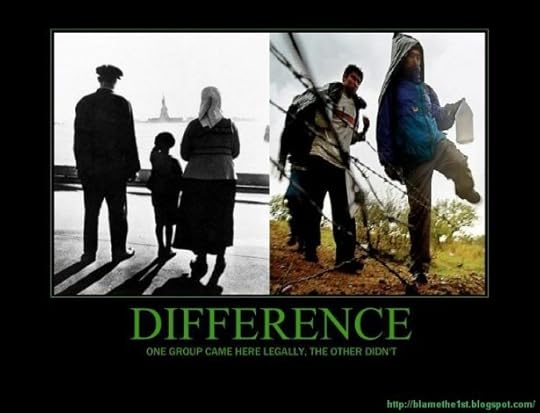
Andy Kirchoff is (according to his Facebook profile), a "GOP-leaning independent Catholic voter." His words (complete words from the original Facebook thread) will be in blue.
* * *
I love his [Clark Durant's] pro-life stance and his education platform, but his immigration position is far too "out there" for me to enthusiastically support his candidacy. He sounds like a NumbersUSA dream candidate.
You're a big fan of illegal immigration?
I'm a fan of keeping gov't from needlessly separating families and communities. Saying that "allowing for illegal immigrants to stay in this country must no longer be accepted" is a rhetorical indication that Mr. Durant is miles apart from me on this issue. It's like how Obama's "I don't want my daughters punished with a baby" shows that he's light years apart from me on the abortion issue.
It was a general statement: nothing in there about separating families. You simply read that into it. But certainly if families of illegals stay then they need to go through a process of legalization. We can't just spit and trample on a perfectly sensible law (allowing immigration through legal channels).
My father was an immigrant from Canada! Perfectly legal. What was he supposed to do: swim the Detroit River, say "to hell with the laws!" and expect to be accepted after so many years here, simply because he is here?
. . . actually, the USA has a history of allowing just that.
The article advocates exactly what I do (paths to legalization through productive citizenship; not indefinite illegal status):
Kentucky was one of the first states to offer squatters a path to legalization. Under the Kentucky system, any squatter whose claim went unchallenged for seven years, and who paid taxes on the land during that period, was eligible for a clear title to the property regardless of who had owned it previously. . . . in 1862 with the passage of the Homestead Act, which gave settlers free federal land if they cultivated it for five years. . .. So should we follow our ancestors' example and offer a path to legalization?
Yes; that is my position. But doing nothing and allowing millions of illegals to exploit our system is outrageous.
You wouldn't allow someone to show up on your own property, build a shack, stay indefinitely and then say he has a "right" to be there.
Obama's statement was general, too, but it revealed deep-seated indication about his ideology. The same applies for Mr. Durant's statement, which indicates that he would prefer that the current law (which demands immediate deportation for illegal immigrants) be enforced. I have no problem "trampling" on such laws, anymore than I have problems trampling on the new HHS mandate if need be. Mr. Durant ostensibly believes otherwise.
You still haven't told me why an illegal immigrant should be allowed to stay: as a general proposition. On what grounds? Make an argument; don't just tell me what you like and don't like; that's like arguing which flavor of ice cream is best: nothing objective.
I think they can stay if they are pursuing legal status and being productive citizens (I agree with what Gingrich has said on this).
More important than obeying civil laws is obeying natural laws. Family unit is part of Catholic Social Teaching; obeying civil laws is not. I'm not saying the law isn't important, but when it comes down to a battle between the two, natural law claims supremacy.
As a "general proposition", illegal immigrants who haven't committed serious crimes should be allowed to stay because they are, by and large, de-facto citizens. Most of them have lived in this country for years, if not decades, and are unable to become citizens because our laws haven't accommodated them the avenues to do so. They are long-standing members of communities, many times having started businesses and employing US citizens.
As a matter of course, the problem with immigration isn't that the law hasn't been enforced. It's the opposite. "The law" in this case is outdated, outmoded, and unable to keep up with the economic needs of the country. It disregards the harm deportation does to families and communities. Like Roe V. Wade, many of our immigration laws are relics from a eugenics-oriented past, and like Roe, they deserve to be overturned.
I see. So you would allow someone to show up on your own property, build a shack, stay indefinitely (let's say he cuts your grass and pulls weeds and uses a nice proper outhouse) and then say he has a "right" to be there" from natural law, and you out of the goodness of your heart welcome him to do so.
Dave, comprehensive immigration reform, the DREAM Act, and numerous guest worker programs are all that same kind of legislation as the Kentucky program mentioned in the article I linked to. The myth of "immigrants exploiting the system" is right up there with Planned Parenthood's myth of "right-wingers wanting women back in the kitchen." It's a myth based on phony statistics made by odious organizations.
Please answer my question about the guy showing up on your property. Humor me. Play philosopher for a moment.
If a man shows up on my property, I'm not obligated to let him in my house. But as the CATO article shows, that's a very poor analogy to the illegal immigration example. Turning this into a "property rights" argument is to miss the point entirely.
So he's not allowed in your house but he is free to live on your lawn and use your water, your garage for a shelter, etc.? Maybe you have a fruit tree and a vegetable garden; now he can be fed, too, from your bounty. And his brother and his family will be moving in soon, too . . . not able to resist all the wonderful opportunities for sustenance that you provide.
If it's my property, my rules apply. I'm free to do what I want irrespective of whether its my house or my yard, or my parking lot, or whatever. But that's not the point. This isn't a property rights argument.
So you would kick them out and say they didn't have the right to be there, huh? What if one of them refused to go? What would you do? Separate families?
I would call the police if someone was invading my property, sure. But that's not what this is about. This is about the state saying that someone's property doesn't matter. Countries and governments do not have the same rights as people (indeed, all they have are powers).
Right now, an illegal immigrant who has been here for years and years can be seized from their homes simply for breaking a eugenics-based immigration law. It's documented, it's happened and is happening.
A person crossing the border to live here is on US property. If he or she is receiving benefits that come from US taxpayers, then we have the perfect right to deny those benefits by enforcing sensible laws. The analogy is perfectly apt and relevant. You simply fail to grasp it. You're inconsistent with your own principles.
You don't apply "bleeding heart liberal" positions when it comes to your own property. You're like the guy who is for gun control and then shoots an invader on his own property (I recall hearing several examples of famous liberals doing just that; don't recall specific names though).
No. This isn't a "bleeding heart liberal" position. I've already cited (and you've acknowledged) how the US gov't has treated its "property." Government does not have universal power of people in its country. That's exactly why the US Constitution was founded on principles of a limited gov't. [ link ]
Explain to me how you can kick these guys off of your property but the US (i.e., states like Arizona and Texas) can't do the same with folks who want to stay illegally in the US. I don't get it. Perhaps you can help me understand these profundities.
I already did explain them. *The government does not have power over people, citizen or non-citizen, when it comes to uprooting people from their property and homes.
Really? How does it ever build a freeway through a city, then? My wife's childhood home got taken out by one in Detroit.
*Only criminal offenses (with written warrants) can bring that kind [of] governmental power to fruition. Immigration laws are merely civil offenses, not criminal ones (which is why SCOTUS is going to shoot down SB1070, among other copycat laws like it). In short, Government, whether state or federal, does not have the rights prescribed to persons. Thank God our founding Fathers saw that.
I'm not talking about someone with property rights. The guy on your lawn has no such rights, which is precisely why you call the police to boot them out (something I would not even do myself, since I always seek to take action without involving legal entities, insofar as humanly possible; nor have I ever owned a handgun, by the way, and have no plans to).
You immediately comprehend that he has no such rights, since it is your property. But you turn around and say that the US government or government of Arizona, etc. have no such corresponding right to kick out a guy living in a barn on someone else's property. It makes no sense whatever, but because of the inherent incoherence of your position, you are forced to adopt nonsense.
And really, if we're going to talk about the Catholic position on immigration, then the "hardline" rhetoric/property rights argument is about as historically anti-Catholic as it gets. I know that sounds harsh, but the historical record is very clear about this. The groups that want to "enforce the laws" have a well-documented history of anti-Catholic animus, and the folks bankrollling them are of Planned Parenthood ilk. The guy who brought about the resurgence of the "property rights" angle to immigration was none other than ex-Catholic Tom Tancredo, whose rhetoric regarding immigration is easily comparable to the "no-nothing" rhetoric of over 100 years ago.
There is a reason why every single US Bishop supported the DREAM Act as a standalone bill (including Cardinal Burke while he was still here). I know that this is a sensitive issue, and I'm not saying that every immigration reform proposal is a good one, but idea that "Cato likes it, therefore it is unCatholic" is simply not going to work given the problems with the other groups who are supporting the "property rights" approach.
I want to understand why you feel you can kick the guy off your land, but our government cannot do so, in your mind. You're not helping me to grasp how your position is possibly consistent. It's very easy to be solely abstract, isn't it? Then when an example or incident "brings it home," all of a sudden it's a far different story.
I've already written about the Catholic [Church's] views on immigration (I agree with what I see there). I'm talking about basic premises (according to my usual socratic philosophical method). Andy's position is radically inconsistent and illogical.
Read my statements again, Dave. The issue is that government doesn't have "people rights." An illegal immigrant is not living on somebody else's property if they bought the land/apartment/house, etc. either, so your analogy doesn't hold water even if gov't did have "people rights." And some form of property ownership -is- the case with most illegal immigrants here in the country today.
Regarding eminent domain, that is, as many conservative commentators noted, one of the great tragedies of the past 5 years. SCOTUS saying eminent domain doesn't matter, and that the gov't can force someone out of their home for a "common good" reason (as I presume your highway example is meant to show), is a tragedy. But that's exactly why laws like sb1070 (which are, again, going to be rightly found unconstitutional ) need to be fought.
I agree with paths to citizenship; I stated that above, several times. So you oppose interstate freeways, too? What if someone doesn't own property and is squatting? Should they be deported? The guy on your land doesn't own your property. You do. You want to get rid of him. So can states do the same towards those who are squatters?
Dave, you are misunderstanding the premise. At issue is the role of government (subsidiarity). We have a limited gov't in the United States that expressedly does not have the rights given to its citizens (hence the CATO article I posted). That is why a "property rights" approach to this issue does not work.
Dave, you are jumping to conclusion far too quickly. Supporting eminent domain doesn't mean I oppose interstate freeways anymore than opposing abortion means I oppose women in the workplace. At issue here is the power of government over people, citizen or non-citizen. Immigration is a civil issue, not a criminal one, and that alone makes state laws on the issue a constitutional conundrum; but that issue aside, government doesn't have the "property rights" that people have (and that the government protects, but by no means "grants").
Here are my questions again that you ignored:
"What if someone doesn't own property and is squatting? Should they be deported? The guy on your land doesn't own your property. You do. You want to get rid of him. So can states do the same towards those who are squatters?"
I couldn't trespass (legally) at an abortion clinic, to save babies. I went to jail for that. If I were like you I could have said, "hey, I don't have to go to jail! I can be inconsistent like Andy!!!"
Regarding "squatting," It is my understanding that state's can't do that, as a matter of law. In terms of the principle, however, and as the CATO article shows, unless an actual person (not a gov't) already has rights to the land, the issue becomes far less about "property rights" and more about the power of the government.
You like freeways, so what do you propose to do differently when a house is in the way? Presently, the owners are given recompense.
People & govt; freeways, so property rights should hold strong here. But again, the gov't isn't a person with property rights.
I see; so someone can set foot in the state of Arizona illegally and find some sandy desert hideout and that's fine and Arizona can do absolutely nothing about it, under pain of being called big meanies and Know-Nothing anti-Catholics by you. But some guy can plop on your lawn and you call the police to remove him. Gotcha. Just so your position is known, for the record . . . Now you're opposed to freeways again. That makes for awfully tedious rush hours . . .
Oh wait; okay, Arizona can't do anything if an illegal is on, say, the property of Grand Canyon National Park (which you and I, with all US citizens, own). He can live there indefinitely in a cave.
But if an illegal immigrant is on a desert plot owned by a private individual, that person (like you) can kick him out and send him to another person's property to be their headache, or (even better) to the Grand Canyon where he'll be safe, since states (so sez you) have no property rights.
RIGHT-O!
False dichotomies are tools of the left, and I won't fall prey to them. If you can't see how I can be for eminent domain (which is to be PRO-property rights!) and still support freeways, I know I'm not going to be able to convince you. Likewise, if you can't see why giving gov't the same rights as a human person is problematic, I'm clearly not going to convince you, either. I can't be responsible for what are clearly deliberate and repeated mischaracterizations of my positions. I think I'm done here. Enjoy your day.
The Immigration Control Act of 1924 (which inspired the system we have today), was written and promoted by eugenicists and supported by none other than Margaret Sanger herself. [ link ]. And of course, that same history of making people into problems (and making the government into a person) continues to this day, as I wrote about... [ link ]
...and that prejudice continues to this day with sb1070, Alabama's religious freedom violating immigration law (which was condemned by the Catholic League as "morally reprehensible"). Tom Tancredo, Mark Krikorian, Russell Pierce...all of these folks responsible for these laws have histories of associating (if not outright endorsing) white supremacists and neo-nazis. It's not unique to Sanger's time, it continues to this very day, and self-described pro-life Catholics, sadly, are falling for it!
Thank you very much, Andy, for an excellent illustration of profound incoherence, complete with the obligatory parting insult, viciously illogical inanities, and the fleeing of a substantive discussion before anything is accomplished. We can see why Socrates was killed (for "corrupting the youth"). He angered lots of folks as well, when he asked too many probing questions about premises. :-)
Equally boring is the usual equation of my reductio ad absurdum of your position (perfectly acceptable logical argumentation in formal logic) to (YAWN) "clearly deliberate and repeated mischaracterizations of my positions." (ZZZzzzzz......)
A martyrdom complex? Really? That's what happens when your worldview receives a challenge, Dave? No one here is threatening you with death or censorship. I answered your question. You just insist on deliberately misstating my point. Fortunately, barring your own censorship of my posts, the record is clear, and I am proud to stand by it.
Quite the contrary; I will make a dialogue out of this and preserve every word of yours. You're allowed to be a pompous ass on my page if you like: especially in the process of intellectually hanging yourself (because there are important points to be made here).
I have simply maintained that you are illogical and inconsistent, while you have implied that my position is the primary domain of racists, bigots, eugenicists, Know-Nothing anti-Catholics, etc.: none of which I have ever had the slightest agreement with. Ah, now we have "martyrdom complex". Any more insults to add before you depart?
You may not agree with the positions of eugenicists in theory, but the record is clear that the position you maintain regarding immigration is the position of said groups. I'm still waiting for you to refute that - not that I expect that you will, as you would rather focus on red herrings regarding freeways than the issue at hand. But by all means, continue. The more you type here, the more others can see what happened here. After all, you are the one tossing around terms like "pompous ass." (And I'm the one being insulting, here? Hmm...).
"Pompous ass" is far less insulting than comparing opponents to neo-Nazis and every scum of the earth, and stating (twice now) that I am engaging in deliberate lying rather than simply arguing according to the established procedures of reductio ad absurdum and socratic method.
That is precisely being a pompous ass (I always use the term with precision, and do so only rarely): thinking you know something that you don't know and insulting others rather than admitting that you don't comprehend what happened.
My position is that of the Catholic Church, far as I can determine (per my posting and espousal of Catholic positions in a post months ago, that I linked to above), so if you wish to tar Holy Mother Church with the same hideous brush that you paint me with, feel free.
I thought you were departed? Now you have to stay simply to offer insult upon insult: thus proving that you can't argue your positions without same? It's clear that any semblance of rational discussion in your comments has disappeared.
If you play the game of deleting your posts (as often happens in these sorts of juvenile flare-ups), it's too late. I've already copied them.
One can come to the same conclusion as an odious group without adopting the same argumentation and reasoning of said group, sure. However, the very strain of argumentation offered here (this whole property rights angle) comes straight from the FAIR playbook - it was literally invented to bring Republicans and conservatives to embrace their xenophobic agenda, just as "freedom to choose" was Bernard Nathanson's mantra in getting feminists to support abortion.
The organic development of Dave's argumentation (not just his position) could be directly lifted from FAIR or NumbersUSA. It's not a matter of arbitrarily coming to the same position; the very root of the ideology is evident from the argumentation. Dave has unwittingly fallen for one of Satan's cunning traps here, and I will stand firm in offering a course correction, just as I hope he would do the same for me.
Ah, Satan is now with us, too. I'm the dupe (albeit "unwittingly") of the Evil One. How melodramatic. Any more insults? I want to make the coming dialogue as colorful and bizarre as it can possibly be! Let 'em fly!
I have absolutely no intention of deleting anything I wrote here. Why would I?
I could think of several reasons (good or otherwise) but I'll desist.
Now I find out that you were a philosophy major, yet comprehend neither a reductio ad absurdum when it is being used [against you], nor socratic method? Wow . . .
* * *
[replying to someone else] I think the issue should be seriously discussed. But we have to discuss premises (and go beyond the usual party lines when doing it: as Gingrich has attempted to do). That's not able to be done when:
1) The person whose premises you are trying to understand, refuses to either properly explain or defend them.
2) The same person continually engages in "poisoning the well" tactics of comparing every position his dialogical opponent states in the worst possible terms, trying to bring about "guilt-by-association."
#2 is what unscrupulous politicians and the ancient Sophists do and did (and involves logical fallacies), whereas socratic method and reductio ad absurdum (what I did) have a long, honorable pedigree going back to Socrates, and are advocated by every introductory logic textbook as perfectly legitimate.
The idea that I didn't answer your questions, be it regarding property rights, governmental power, freeways, or anything else, despite the multiple times I answered it, is an allegation that the record contradicts: [cited two sections preceded by * above]
Andy remarked (in the combox below) about the above paragraph and the two below:
A comment that Dave omitted from his posting here on his blog, that is nonetheless available on his facebook page (and was posted well before he posted this blog entry, as well):
"Well before" was all of about 29 minutes. I was putting together the blog version of the Facebook thread and Andy put in another comment that I missed because I was busy posting the dialogue. But most of it was citing again two previous paragraphs. What follows below (from the combox) was posted an hour after my blog post was first put up:
Additionally, that I reject the property rights view of the immigration issue is not an indication that I didn't answer his question. The idea that demonstrating that there is a logical connection between the argumentation a party offers and the argumentation offered by others is not sophistry. It is not "poisoning the well." On the contrary, trying to draw arbitrary equivocations between entities that are not equal is sophistry (sophists were famous for saying distinctions were arbitrary). Saying that a person and a government are indistinguishable, either in terms of the property rights question or the general understanding of the term, is something I'd expect from someone completely unfamiliar with basic argumentation - certainly a Catholic apologist or Scripture scholar should know better.
It is fair to disagree with my position on gov't vs. personal property rights. It is not fair to say that I didn't answer the questions presented.
I'm not gonna play logical ring around the rosey with you at this point, after you have thrown up all your usavory sophistical garbage, trying to discredit your opponent rather than argue rationally (rather like some unnamed parties in the GOP primary habitually do). Now you try to talk sensibly and philosophically, having exhausted the ample supply of manure that you had in your "arsenal." Whatever interest I had in discussion with you is now long since passed.
Let me just note in reply to this last salvo that I didn't claim you gave no "answer" at all. You provided plenty of "answers": but they were sophistical and obscurantist ones. What I have persistently complained about is your failure to properly explain or defend your view. For example:
You still haven't told me why an illegal immigrant should be allowed to stay . . .
Explain to me how you can kick these guys off of your property but the US (i.e., states like Arizona and Texas) can't do the same with folks who want to stay illegally in the US.
I want to understand why you feel you can kick the guy off your land, but our government cannot do so, in your mind.
The person whose premises you are trying to understand, refuses to either properly explain or defend them.
I did state that there were some specific questions you "ignored" -- which is true: readers can go consult that section if they wish and search in vain for any rational explanations of yours (as opposed to mere bald assertions coupled with poisoned-well accusations: your specialty).
I don't waste time arguing with sophists and epithet-specialists, and those who specialize (consciously or unconsciously) in toying with fallacies. My time is too valuable for that. Accordingly, this is our final attempted "dialogue" (....choke.....).
Andy wrote over on his blog:
My final point was conveniently omitted from his blog posting here, but it's still available in the facebook record, happily.
Note the cynicism, as if I were deliberately trying to avoid something (after posting truckloads of Andy's words and (in my opinion) dubious arguments and methods. I explained this above. It had a very simple explanation. No evil, malicious intent here . . .
There are also other omissions from the facebook exchange, as well.
More of the same. The only things I omitted were comments of others and Andy's replies to those, since this was a two-man dialogue for the educational and pedagogical purposes of this post. There is no moral or philosophical requirement, anyway, that I include every last word, even by others. If one wants those, they simply go to the top of this post and hit the link to the Facebook thread. It takes a tenth of a second and they can get every last word. I have included all of Andy's words in reply to myself.
I get extremely tired of these kinds of asinine complaints (that are recurrent whenever I post dialogues: of which I have over 600 online), when I have already taken the greatest pains to post all of my opponent's words (in reply to me) for all to see on my site.
. . . I'm quite content that the blogger had his conscience pricked enough to write about it. It is my prayer and hope that, just as my hardened heart was changed on this issue after years of obstinate clinging to the other side, his heart will also be changed.
This explains quite a bit. It's classic "us vs. them" paranoid, hyper-partisan-type rhetoric. To disagree with Andy's position is to be a "bad guy": to have an obstinate, hardened heart. This is no speculation; he has now come right out and said it (I already knew the attitude was there). One cannot possibly have a different position and be a good moral person and good Catholic, holding it with a full Catholic (or otherwise Christian) conscience, in good faith. Andy uses the very terminology of regenerate and unregenerate, in effect, the side of light vs. the dark "side" ("hardened hearts" in the Bible refers to being unregenerate and altogether wicked, and certainly Andy must know this; it's classic biblical language and categories). Notice this very closely.
Now, the most fascinating thing is that Andy admits that he held the opposite view for "years". In light of how he has described views in illegal immigration other than his own: bigots, know-nothings, in bed with anti-Catholic prejudicial views about foreigners, etc., we can safely assume that he must have been a bigot in former years (deduced on how he describes other views and his admission to having held them himself). This is very revealing indeed. It means that he thinks he has now "seen the light" and that anyone who differs with him is still in darkness, with a hardened heart.
It's the stereotypical demonizing of political opponents: a thing now rampant in national politics, to the detriment of intelligent, constructive, problem-solving governance. It's going on as I write, this very day: with Republican candidate Rick Santorum being ripped up and down by the media and operatives of the left and the Democratic Party (if there is any difference, anymore) simply for expressing his Catholic religious beliefs.
Having been rescued from bigotry himself (at the ripe old age of 22: a new man, as it were), now Andy is on a mission to get all of us bigots "saved," as he is. Quite obviously, he is projecting all of his past bigotry onto folks like me, and others who oppose illegal immigration in some sense. The problem is that it doesn't fit. He may be condemning his past self, but he is not condemning me in any way, shape, matter, or form, since I have never been tainted by racism or prejudice in my views at any time of my life.
I've been intensely, passionately interested in race relations issues for literally 45 years: since the riots in Detroit in 1967. I've visited many of the famous civil rights sites (Martin Luther King's house, church, where he was killed, site of his last speech, Selma, the location of Rosa Parks and the bus, etc.). We religiously teach our children to detest racism and all prejudice and teach them the history of slavery, the Undergound Railroad, the civil rights movement, etc.
I've written passionately of the evils of how Native Americans have been treated, and of slavery and subsequent denial of the rights of African-Americans. I detest all such discrimination with every fiber of my being, and that includes Mexican-Americans or any other ethnic group being treated poorly and deprived of due rights. It's why I'm pro-life and have been arrested five times, gone through three trials, and spent time in jail: because my compassion extends to the smallest and most helpless of all among us.
All of that is a matter of record, and I have believed and held and communicated and defended these views for twice as long as Andy has been alive. I met Rosa Parks at a trial about alleged prejudice in Detroit in 1986, before Andy was even born. I was in jail for the "crime" of saving babies from being butchered, before he was a twinkle in his father's eye (back in 1988). Yet here he is arrogantly lecturing me about how my heart needs to be changed, solely based on his past history of bigotry, as if that has anything to do with me, or automatically to do with anyone who disagrees with him.
I absolutely detest such an attitude and condemn it in the strongest terms. Andy's past sins are his own. If he is outraged by his past views and behavior, great. We all live and learn. I wasn't burdened by prejudice, ever, but I had and have many other faults and sins, as we all do. I'm delighted that he has reformed himself by God's grace and has seen the light. Projecting his sins and past hypocrisies and outrages onto myself and others, however, with absurd simple-mindedness, is the height of folly, hypocrisy, and presumption. I'm not trying to just pile on Andy, but rather, I am using this current pathetic example as an illustration of exactly how not to approach an opponent in dialogue.
My hope for him is not that his "heart" ceases being hardened, etc.: as if he were a "bad" person. My concern is that he learns to argue his positions rationally, minus the ridiculous demonization tactics, projection, and hypocritical judgmentalism based on his contempt for his own past behavior. He needs to learn to discuss things objectively, minus the pretense of alleged high moral ground that he supposedly possesses to an exceptional degree, while all who disagree with him are supposedly demons and morons.
And that goes for anyone who attempts dialogue, on political issues or anything else. We all need to guard against this pompous attitude. Heaven help me if I fall into it. I want to be sternly rebuked if and when I do so. May God guide all of us as we discuss issues and share our faith.
***
Published on February 21, 2012 15:03
February 19, 2012
Big Book News: 15 E-Pubs for $29.95 / Lowered Paperback Prices / All Titles Available Individually / Redesigned Books Page

Cheap books, yes, but also quality books . . .! I have made a lot of changes in order to sell more books: the ongoing task of every full-time author: especially those, like myself, largely depending on royalties for their income). Here they are (follow the links for more detailed information):
1) 15 e-Pubs and PDFs for $29.95. This is my new e-book package deal (both kinds of files for each title, for a total of 30 book files). It includes my two brand-new (February 2012) books: Classic Catholic Biblical Apologetics: 1525-1925 and Biblical Evidence for the Communion of Saints . E-Pubs are the coming trend in reading. The reason is that they can be conveniently read on virtually all mobile, hand-held devices, such as iPod, iPad, iPhone, BlackBerry, Sony Readers, Barnes and Noble Nook, Bookeen, Cybook Opus, Mobi, Kobo E-Reader, Android devices, and Amazon Kindle. More info. about accessibility on the 15-books deal page. The savings in this deal are astounding by any measure: 87% lower cost than all the books purchased as paperbacks ($224.25), a 71% savings on prices of all ePubs ($4.99) and PDFs ($1.99) purchased individually ($104.70), and 60% less than all 15 ePubs bought individually ($74.85). 3671 pages total: a complete Catholic apologetics encyclopedia in your pocket or on your PC!!
2) Standardized E-Book Pricing. All of my Lulu e-books (I own the copyright) have set prices: a remarkably low $4.99 for ePubs and only $1.99 for PDFs. Most ePubs to be found online (Kindle, Nook, etc.) sell for $8.99. My PDFs previously were sold for $3.00 or $5.00. So you save 34% or 60% from my previous prices on PDFs, and 44% from the most common ePub cost. This is permanent pricing, too: not just a temporary sale. It's all designed to make book sales irresistible for lovers of apologetics (hint hint!).
3) Virtually all titles available as individual e-books. If you have bought my package deal before, or are interested only in select titles, you can buy most of them individually (and still quite inexpensively) as e-books: either ePubs or PDFs. A few of my "officially" published books are unavailable as e-books as of yet, but I think they likely will be in the not-too-distant future. Two out of my 20 Lulu books are available only as PDFs. Biblical Catholic Answers for John Calvin is available as an ePub only in the package deal (simply because I had insurmountable difficulties uploading it to Lulu).
4) Reductions of Paperback Prices Across the Board. The 20 Lulu titles are now all priced at $13.95, $14.95 (the majority), or $15.95 (just a few), depending on numbers of pages. Generally, this is a $2.00 reduction from the previous price; sometimes $3.00 less. I am trying to keep the prices as low as I possibly can, to still make a half-decent royalty, but increase my overall income by volume sales. I'm thinking of you, the consumer (because I am also a book buyer and lover as well as an author, and know how it is). Please reward my rock-bottom prices by purchasing! This is about as low as you'll see any sizable paperbacks sold these days, and my books certainly average well over 200 pages each (in the package deal, the average pages per book are 245). You are getting much more than your money's worth.
5) Easier-to-Use Complete Redesign of My Books Page. This is the "one-stop" page that contains all of my 29 books. I have sought to make it a lot simpler, with larger categories of books, standard size of book cover icons, and comprehensive ordering links for each book. It's all there. Every book cover or title (except for the two Bible and my pamphlet) links to an individual book page that has Tables of Contents, Introductions, large cover photos, and excerpts and other information. Under each book cover is complete instant ordering information (links): for paperback, 15 e-book package deal, ePub, PDF, Amazon Kindle, Barnes and Noble Nook Books, and iTunes: all allowing instant purchase and (excepting paperbacks, of course) immediate downloads.
* * *
Thanks for reading! If you like my work and think it is worthwhile for apologetics and evangelistic and educational purposes, please purchase, so that I will be able to continue this full-time apostolate (book royalties and generous tax-deductible donations constitute my entire income), and please help me advertise more widely (if you feel so inclined), with links. The harvest is ready. As I said at the top: "cheap" books, yes, but also quality books . . . God bless you, and to God be all the glory and praise!
* * *
Published on February 19, 2012 01:55
February 18, 2012
Dave Armstrong: Catholic Apologetics Bookstore: 29 Books; Featuring 15 E-Books (E-PUBs + PDFs) for Only $29.95!: 87% Savings from Paperback Prices! Mobile Device Capacity ...

--- All book titles (save the two Bibles and pamphlets) have individual book pages, with Tables of Contents, Introductions, excerpts, large photos of front and back covers, and sometimes reviews. Click on any book icon or written title to access these info-pages. ---
--- The 15 E-Book Package Deal ($29.95) [see the books included] includes ePubs and PDFs for each title. This is 87% lower cost than all the books purchased as paperbacks ($224.25), a 71% savings on prices of all ePubs ($4.99) and PDFs ($1.99) purchased individually ($104.70), and 60% less than all 15 ePubs bought individually ($74.85). 3671 pages total: a compete Catholic apologetics encyclopedia.---
--- My own Lulu paperbacks are all sold for the low low price of $13.95, $14.95, or $15.95 (depending on number of pages). I bring you prices as low as they can possibly be. Please reciprocate with a purchase! ---
--- ePub files are able to be read on virtually all mobile, hand-held devices, such as iPod, iPad, iPhone, BlackBerry, Sony Readers, Barnes and Noble Nook, Bookeen, Cybook Opus, Mobi, Kobo E-Reader, Android devices, and Amazon Kindle (with an easy file conversion). Kindle books can be read on other devices, with the aid of various apps. You may have to install the free program Adobe Digital Editions. All of my ePubs are DRM-protected. The free Bluefire Reader app allows one to read DRM ePubs on iPod, iPad, iPhone, and Androids (see detailed guide / guide #2). Several of my titles are sold at iTunes (listed below). See a more general guide for mobile e-book reading. Firefox users can get the EPUB Reader Add-on. The e-Book Converter site is very helpful. ---
--- All of my own ePubs (sold at Lulu and other venues) are sold for the rock-bottom price of $4.99 individually and a remarkable $1.99 in the $29.95 package deal. PDFs are all a standard price of $1.99. Kindles are mostly $4.99. My "official" publishers set their own prices, and I have no say in that. ---
 ORDER 15 BOOKS NOW ($29.95: E-PUBs + PDFs)
ORDER 15 BOOKS NOW ($29.95: E-PUBs + PDFs)
(General) Apologetics Bestsellers
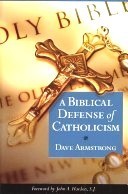 A Biblical Defense of Catholicism (1996/2003, 297p) [PAPERBACK: $24.95] [E-PUB: ] [PDF: ] [KINDLE: ] [NOOK: ] [iTUNES: ]
A Biblical Defense of Catholicism (1996/2003, 297p) [PAPERBACK: $24.95] [E-PUB: ] [PDF: ] [KINDLE: ] [NOOK: ] [iTUNES: ]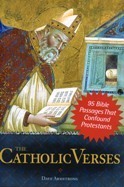
The Catholic Verses: 95 Bible Passages That Confound Protestants (2004, 235p) [PAPERBACK: $21.95] [E-PUB: ] [PDF: ] [KINDLE: ] [NOOK: ] [iTUNES: ]
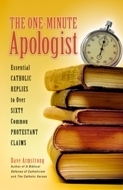 The One-Minute Apologist: Essential Catholic Replies to Over Sixty Common Protestant Claims (2007, 143p) [PAPERBACK: $18.95] [E-PUB: ] [PDF: ] [KINDLE: 9.95] [NOOK: ] [iTUNES: ]
The One-Minute Apologist: Essential Catholic Replies to Over Sixty Common Protestant Claims (2007, 143p) [PAPERBACK: $18.95] [E-PUB: ] [PDF: ] [KINDLE: 9.95] [NOOK: ] [iTUNES: ]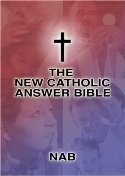 The New Catholic Answer Bible
(co-author, Dr. Paul Thigpen, 2011, 2008 pages with additional apologetics inserts; Revised NAB version) [PAPERBACK-OSV] [PAPERBACK-Amazon]
The New Catholic Answer Bible
(co-author, Dr. Paul Thigpen, 2011, 2008 pages with additional apologetics inserts; Revised NAB version) [PAPERBACK-OSV] [PAPERBACK-Amazon]The New Catholic Answer Bible (co-author, Dr. Paul Thigpen, 2005, 1394 pages with additional apologetics inserts; NAB version) [PAPERBACK-Amazon]
 The Catholic Answer Bible
(2002, 1394 pages with additional apologetics inserts: my contribution) [PAPERBACK - OSV / Amazon] [PAPERBACK - Fireside / Amazon]
The Catholic Answer Bible
(2002, 1394 pages with additional apologetics inserts: my contribution) [PAPERBACK - OSV / Amazon] [PAPERBACK - Fireside / Amazon] 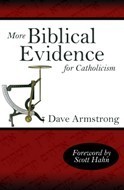 More Biblical Evidence for Catholicism (2002 181p) [15-BK PACKAGE (29.95): E-PUB+PDF: 1.99] [PAPERBACK: $13.95] [E-PUB: 4.99] [PDF: 1.99] [KINDLE: 4.99] [NOOK: 8.99] [iTUNES: 4.99]
More Biblical Evidence for Catholicism (2002 181p) [15-BK PACKAGE (29.95): E-PUB+PDF: 1.99] [PAPERBACK: $13.95] [E-PUB: 4.99] [PDF: 1.99] [KINDLE: 4.99] [NOOK: 8.99] [iTUNES: 4.99]
Top Ten Questions Catholics Are Asked (2002, pamphlet; package of 50) [OSV] Top Ten Questions Catholics Are Asked (2003, pamphlet; package of 50; Spanish) [OSV]
Collections of Quotations
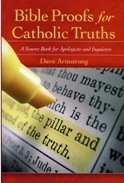 Bible Proofs for Catholic Truths (2009, 445 pages) [PAPERBACK: $24.95] [E-PUB: ] [PDF: ] [KINDLE: 9.95] [NOOK: ] [iTUNES: ]
Bible Proofs for Catholic Truths (2009, 445 pages) [PAPERBACK: $24.95] [E-PUB: ] [PDF: ] [KINDLE: 9.95] [NOOK: ] [iTUNES: ]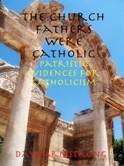 The Church Fathers Were Catholic: Patristic Evidences for Catholicism
(2007, 360p) [15-BK PACKAGE (29.95): E-PUB+PDF: 1.99] [PAPERBACK: $15.95] [E-PUB: 4.99] [PDF: 1.99] [KINDLE: 5.99] [NOOK: 8.99] [iTUNES: 4.99]
The Church Fathers Were Catholic: Patristic Evidences for Catholicism
(2007, 360p) [15-BK PACKAGE (29.95): E-PUB+PDF: 1.99] [PAPERBACK: $15.95] [E-PUB: 4.99] [PDF: 1.99] [KINDLE: 5.99] [NOOK: 8.99] [iTUNES: 4.99] Classic Catholic Biblical Apologetics: 1525-1925 (2012, 246p) [15-BK PACKAGE (29.95): E-PUB+PDF: 1.99] [PAPERBACK: $14.95] [E-PUB: 4.99] [PDF: 1.99] [KINDLE: ] [NOOK: ] [iTUNES: ]
Classic Catholic Biblical Apologetics: 1525-1925 (2012, 246p) [15-BK PACKAGE (29.95): E-PUB+PDF: 1.99] [PAPERBACK: $14.95] [E-PUB: 4.99] [PDF: 1.99] [KINDLE: ] [NOOK: ] [iTUNES: ] The Wisdom of Mr. Chesterton: The Very Best Quotes, Quips & Cracks from the Pen of G. K. Chesterton (2009, 265 pages) [PAPERBACK: $17.95] [E-PUB: 9.98] [PDF: ] [KINDLE: 9.98] [NOOK: 9.98] [iTUNES: ]
The Wisdom of Mr. Chesterton: The Very Best Quotes, Quips & Cracks from the Pen of G. K. Chesterton (2009, 265 pages) [PAPERBACK: $17.95] [E-PUB: 9.98] [PDF: ] [KINDLE: 9.98] [NOOK: 9.98] [iTUNES: ][image error] The Quotable Newman [~450p; coming in spring 2012] [PAPERBACK: $] [E-PUB: 9] [PDF: ] [KINDLE: ] [NOOK: ] [iTUNES: ]

ORDER 15 BOOKS NOW ($29.95: E-PUBs + PDFs)
Specific Theological Topics
 Biblical Catholic Salvation: "Faith Working Through Love"
(2010, 187p) [15-BK PACKAGE (29.95): E-PUB+PDF: 1.99] [PAPERBACK: $13.95] [E-PUB: 4.99] [PDF: 1.99] [KINDLE: 4.99] [NOOK: 8.99] [iTUNES: 4.99]
Biblical Catholic Salvation: "Faith Working Through Love"
(2010, 187p) [15-BK PACKAGE (29.95): E-PUB+PDF: 1.99] [PAPERBACK: $13.95] [E-PUB: 4.99] [PDF: 1.99] [KINDLE: 4.99] [NOOK: 8.99] [iTUNES: 4.99]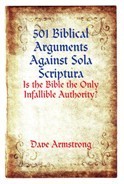 501 Biblical Arguments Against
Sola Scriptura
: Is the Bible the Only Infallible Authority?
(2009, 240p) [15-BK PACKAGE (29.95): E-PUB+PDF: 1.99] [PAPERBACK: $14.95] [E-PUB: 4.99] [PDF: 1.99] [KINDLE: 4.99] [NOOK: 8.99] [iTUNES: 4.99]
501 Biblical Arguments Against
Sola Scriptura
: Is the Bible the Only Infallible Authority?
(2009, 240p) [15-BK PACKAGE (29.95): E-PUB+PDF: 1.99] [PAPERBACK: $14.95] [E-PUB: 4.99] [PDF: 1.99] [KINDLE: 4.99] [NOOK: 8.99] [iTUNES: 4.99][image error]
100 Biblical Arguments Against Sola Scriptura [~130p; coming in spring 2012] [PAPERBACK: $] [E-PUB: ] [PDF: ] [KINDLE: ] [NOOK: ] [iTUNES: ]
 "The Catholic Mary": Quite Contrary to the Bible?
(2010, 193p) [15-BK PACKAGE (29.95): E-PUB+PDF: 1.99] [PAPERBACK: $13.95] [E-PUB: 4.99] [PDF: 1.99] [KINDLE: 4.99] [NOOK: 8.99] [iTUNES: 4.99]
"The Catholic Mary": Quite Contrary to the Bible?
(2010, 193p) [15-BK PACKAGE (29.95): E-PUB+PDF: 1.99] [PAPERBACK: $13.95] [E-PUB: 4.99] [PDF: 1.99] [KINDLE: 4.99] [NOOK: 8.99] [iTUNES: 4.99]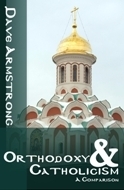 Orthodoxy and Catholicism: A Comparison
(2004, 232p) [15-BK PACKAGE (29.95): E-PUB+PDF: 1.99] [PAPERBACK: $14.95] [E-PUB: 4.99] [PDF: 1.99] [KINDLE: 4.99] [NOOK: 8.99] [iTUNES: 4.99]
Orthodoxy and Catholicism: A Comparison
(2004, 232p) [15-BK PACKAGE (29.95): E-PUB+PDF: 1.99] [PAPERBACK: $14.95] [E-PUB: 4.99] [PDF: 1.99] [KINDLE: 4.99] [NOOK: 8.99] [iTUNES: 4.99]
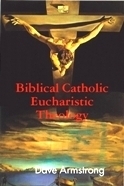 Biblical Catholic Eucharistic Theology
(2011, 222p) [15-BK PACKAGE (29.95): E-PUB+PDF: 1.99] [PAPERBACK: $14.95] [E-PUB: 4.99] [PDF: 1.99] [KINDLE: 4.99] [NOOK: ] [iTUNES: ]
Biblical Catholic Eucharistic Theology
(2011, 222p) [15-BK PACKAGE (29.95): E-PUB+PDF: 1.99] [PAPERBACK: $14.95] [E-PUB: 4.99] [PDF: 1.99] [KINDLE: 4.99] [NOOK: ] [iTUNES: ]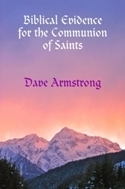 Biblical Evidence for the Communion of Saints
(2012, 152p) [15-BK PACKAGE (29.95): E-PUB+PDF: 1.99] [PAPERBACK: $13.95] [E-PUB: 4.99] [PDF: 1.99] [KINDLE: ] [NOOK: ] [iTUNES: ]
Biblical Evidence for the Communion of Saints
(2012, 152p) [15-BK PACKAGE (29.95): E-PUB+PDF: 1.99] [PAPERBACK: $13.95] [E-PUB: 4.99] [PDF: 1.99] [KINDLE: ] [NOOK: ] [iTUNES: ]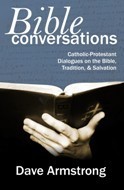
Bible Conversations: Catholic-Protestant Dialogues on the Bible, Tradition, and Salvation (2002, 218p) [PAPERBACK: $14.95] [E-PUB: 4.99] [PDF: 1.99] [KINDLE: 4.99] [NOOK: 8.99] [iTUNES: 4.99]
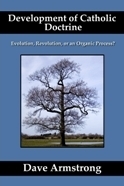 Development of Catholic Doctrine: Evolution, Revolution, or an Organic Process?
(2002, 198p) [15-BK PACKAGE (29.95): E-PUB+PDF: 1.99] [PAPERBACK: $14.95] [E-PUB: 4.99] [PDF: 1.99] [KINDLE: 4.99] [NOOK: 8.99] [iTUNES: 4.99]
Development of Catholic Doctrine: Evolution, Revolution, or an Organic Process?
(2002, 198p) [15-BK PACKAGE (29.95): E-PUB+PDF: 1.99] [PAPERBACK: $14.95] [E-PUB: 4.99] [PDF: 1.99] [KINDLE: 4.99] [NOOK: 8.99] [iTUNES: 4.99]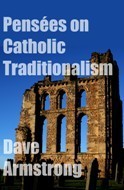 Pensées on Catholic Traditionalism
(2002, 170p) [PAPERBACK: $13.95] [PDF: 1.99] [KINDLE: 4.99] [NOOK: ] [iTUNES: ]
Pensées on Catholic Traditionalism
(2002, 170p) [PAPERBACK: $13.95] [PDF: 1.99] [KINDLE: 4.99] [NOOK: ] [iTUNES: ]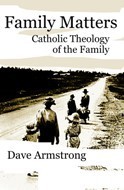 Family Matters: Catholic Theology of the Family
(2002, 159p) [PAPERBACK: $13.95] [E-PUB: 4.99] [PDF: 1.99] [KINDLE: 4.99] [NOOK: 8.99] [iTUNES: 4.99]
Family Matters: Catholic Theology of the Family
(2002, 159p) [PAPERBACK: $13.95] [E-PUB: 4.99] [PDF: 1.99] [KINDLE: 4.99] [NOOK: 8.99] [iTUNES: 4.99]Protestantism
 Martin Luther: Catholic Critical Analysis and Praise
(2008, 264p) [15-BK PACKAGE (29.95): E-PUB+PDF: 1.99] [PAPERBACK: $14.95] [E-PUB: 4.99] [PDF: 1.99] [KINDLE: 4.99] [NOOK: ] [iTUNES: ]
Martin Luther: Catholic Critical Analysis and Praise
(2008, 264p) [15-BK PACKAGE (29.95): E-PUB+PDF: 1.99] [PAPERBACK: $14.95] [E-PUB: 4.99] [PDF: 1.99] [KINDLE: 4.99] [NOOK: ] [iTUNES: ] Biblical Catholic Answers for John Calvin
(2010, 388p) [15-BK PACKAGE (29.95): E-PUB+PDF: 1.99] [PAPERBACK: $15.95] [PDF: 1.99] [KINDLE: 5.99] [NOOK: ] [iTUNES: ]
Biblical Catholic Answers for John Calvin
(2010, 388p) [15-BK PACKAGE (29.95): E-PUB+PDF: 1.99] [PAPERBACK: $15.95] [PDF: 1.99] [KINDLE: 5.99] [NOOK: ] [iTUNES: ]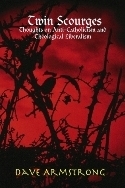 Twin Scourges: Thoughts on Anti-Catholicism & Theological Liberalism
(2003, 167p) [PAPERBACK: $13.95] [PDF: 1.99] [KINDLE: 4.99] [NOOK: ] [iTUNES: ]
Twin Scourges: Thoughts on Anti-Catholicism & Theological Liberalism
(2003, 167p) [PAPERBACK: $13.95] [PDF: 1.99] [KINDLE: 4.99] [NOOK: ] [iTUNES: ]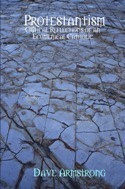 Protestantism: Critical Reflections of an Ecumenical Catholic
(2003, 188p) [PAPERBACK: $13.95] [E-PUB: 4.99] [PDF: 1.99] [KINDLE: 4.99] [NOOK: ] [iTUNES: ]
Protestantism: Critical Reflections of an Ecumenical Catholic
(2003, 188p) [PAPERBACK: $13.95] [E-PUB: 4.99] [PDF: 1.99] [KINDLE: 4.99] [NOOK: ] [iTUNES: ]General Christian Apologetics / Atheists and Agnostics [For General Readers; Contain No Distinctively Catholic Material]
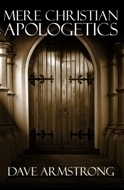
Mere Christian Apologetics (2002, 289p) [15-BK PACKAGE (29.95): E-PUB+PDF: 1.99] [PAPERBACK: $14.95] [E-PUB: 4.99] [PDF: 1.99] [KINDLE: 4.99] [NOOK: 8.99] [iTUNES: 4.99]
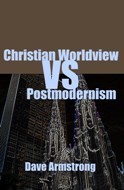 Christian Worldview vs. Postmodernism (2002, 218p) [15-BK PACKAGE (29.95): E-PUB+PDF: 1.99] [PAPERBACK: $14.95] [E-PUB: 4.99] [PDF: 1.99] [KINDLE: 4.99] [NOOK: 8.99] [iTUNES: 4.99]
Christian Worldview vs. Postmodernism (2002, 218p) [15-BK PACKAGE (29.95): E-PUB+PDF: 1.99] [PAPERBACK: $14.95] [E-PUB: 4.99] [PDF: 1.99] [KINDLE: 4.99] [NOOK: 8.99] [iTUNES: 4.99] Science and Christianity: Close Partners or Mortal Enemies? (2010, 301p) [15-BK PACKAGE (29.95): E-PUB+PDF: 1.99] [PAPERBACK: $15.95] [E-PUB: 4.99] [PDF: 1.99] [KINDLE: ] [NOOK: ] [iTUNES: ]
Science and Christianity: Close Partners or Mortal Enemies? (2010, 301p) [15-BK PACKAGE (29.95): E-PUB+PDF: 1.99] [PAPERBACK: $15.95] [E-PUB: 4.99] [PDF: 1.99] [KINDLE: ] [NOOK: ] [iTUNES: ]
ORDER 15 BOOKS NOW ($29.95: E-PUBs + PDFs)
Thanks for your purchases and for reading. Please visit again! God bless you.
* * *
Published on February 18, 2012 12:57
15 of My E-Books (E-PUBs + PDFs) for Only $29.95!: 87% Savings from Paperback Prices! Mobile Hand-Held Device Capacity . . .

--- The 15 E-Book Package Deal ($29.95) includes ePubs and PDFs for each title. This is 87% lower cost than all the books purchased as paperbacks ($224.25), a 71% savings on prices of all ePubs ($4.99) and PDFs ($1.99) purchased individually ($104.70), and 60% less than all 15 ePubs bought individually ($74.85). ---
--- All book titles have individual book pages, with Tables of Contents, Introductions, excerpts, large photos of front and back covers, and sometimes reviews. Click on any book icon or written title to access these info-pages. ---
--- 3671 pages: a complete Catholic apologetics encyclopedia and able to be read on all mobile, hand-held devices. ---
--- ePub files are able to be read on virtually all mobile, hand-held devices, such as iPod, iPad, iPhone, BlackBerry, Sony Readers, Barnes and Noble Nook, Bookeen, Cybook Opus, Mobi, Kobo E-Reader, Android devices, and Amazon Kindle (with an easy file conversion). Kindle books can be read on other devices, with the aid of various apps. You may have to install the free program Adobe Digital Editions. All of my ePubs are DRM-protected. The free Bluefire Reader app allows one to read DRM ePubs on iPod, iPad, iPhone, and Androids (see detailed guide / guide #2). Several of my titles are sold at iTunes (listed below). See a more general guide for mobile e-book reading. Firefox users can get the EPUB Reader Add-on. The e-Book Converter site is very helpful. ---
 ORDER 15 BOOKS NOW
ORDER 15 BOOKS NOW
 Classic Catholic Biblical Apologetics: 1525-1925 (2012, 246p)
Classic Catholic Biblical Apologetics: 1525-1925 (2012, 246p) Biblical Evidence for the Communion of Saints
(2012, 152p)
Biblical Evidence for the Communion of Saints
(2012, 152p) Biblical Catholic Eucharistic Theology
(2011, 222p)
Biblical Catholic Eucharistic Theology
(2011, 222p)  Science and Christianity: Close Partners or Mortal Enemies? (2010, 301p)
Science and Christianity: Close Partners or Mortal Enemies? (2010, 301p) "The Catholic Mary": Quite Contrary to the Bible?
(2010, 193p)
"The Catholic Mary": Quite Contrary to the Bible?
(2010, 193p) ORDER 15 BOOKS NOW
ORDER 15 BOOKS NOW
 Biblical Catholic Salvation: "Faith Working Through Love"
(2010, 187p)
Biblical Catholic Salvation: "Faith Working Through Love"
(2010, 187p) Biblical Catholic Answers for John Calvin
(2010, 388p)
Biblical Catholic Answers for John Calvin
(2010, 388p)  501 Biblical Arguments Against
Sola Scriptura
: Is the Bible the Only Infallible Authority?
(2009, 240p)
501 Biblical Arguments Against
Sola Scriptura
: Is the Bible the Only Infallible Authority?
(2009, 240p)  Martin Luther: Catholic Critical Analysis and Praise
(2008, 264p)
Martin Luther: Catholic Critical Analysis and Praise
(2008, 264p)  The Church Fathers Were Catholic: Patristic Evidences for Catholicism
(2007, 360p)
The Church Fathers Were Catholic: Patristic Evidences for Catholicism
(2007, 360p) Orthodoxy and Catholicism: A Comparison
(2004, 232p)
Orthodoxy and Catholicism: A Comparison
(2004, 232p)  More Biblical Evidence for Catholicism (2002 181p)
More Biblical Evidence for Catholicism (2002 181p) Mere Christian Apologetics (2002, 289p)
Mere Christian Apologetics (2002, 289p)  Christian Worldview vs. Postmodernism (2002, 218p)
Christian Worldview vs. Postmodernism (2002, 218p) Development of Catholic Doctrine: Evolution, Revolution, or an Organic Process?
(2002, 198p)
Development of Catholic Doctrine: Evolution, Revolution, or an Organic Process?
(2002, 198p)  ORDER 15 BOOKS NOW
ORDER 15 BOOKS NOW
[Back to Main Books Page]
***
Published on February 18, 2012 11:42
February 15, 2012
The (Abundant) Biblical Evidence for Lent
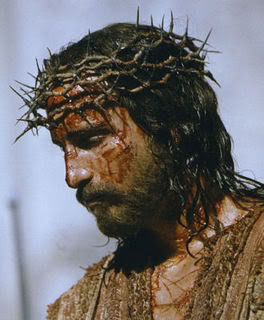
Someone asked me on my Facebook page: "How come we celebrate Lent...and the word is not in Scripture?"
"Lent" simply comes from Old English for "spring" (I learned that just now). "Trinity" (the word) is not in Scripture, either. Christian church buildings are not in Scripture. "Original sin" (the term) is not in Scripture (the concept is). The biblical books are not listed in Scripture itself. Nothing new here.
The practices and beliefs regarding Lent are all eminently biblical. For example, see this paper of mine: Biblical Evidence for Penitential Mortification of the Flesh (Sackcloth / Hair Shirts) . In my book, Bible Proofs for Catholic Truths I also include the chapter, "Fasting, abstinence, and Lent" (seven pages). I wrote at the end of that (p. 322):
The forty days of Lenten observance have several forty day parallels in Scripture (all listed above): Moses' fasts on the the holy mountain (Ex 24:18; 34:28; Deut 9:9) and his intercession for Israel (Deut 9:25), Elijah's journey to Mt. Horeb (1 Ki 19:8), Ezekiel's lying on one side (Ezek 4:6), and Christ's fast in the wilderness (Mt 4:2).
The chapter following is entitled, "We use ashes to show our penitence" [Ash Wednesday] (three pages). See also my online papers:
Biblical (Pauline) Evidence For the Catholic Examination of Conscience
Lenten Meditation #1: NT on Suffering With Christ
Friday as a Required Day of Penance (Not Necessarily Abstinence From Meat) in the United States: a Clarification
Meat and Penitential Abstinence on Fridays: a "Doctrinal" Matter? Dialogue With Calvinist Pilgrimsarbour
Reasons for Suffering and Encouragement and Hope in the Midst of It: A Biblical Compendium
All perfectly biblical practices, with many examples (most explicit and immediately relevant to the topic) . . . As usual, we Catholics are most in line with biblical teaching and practice. Those Christians who don't practice Lent (like myself in my first 32 years: though I would fast at times) miss out on these important penitential aspects of the faith.
***
Published on February 15, 2012 09:10
February 11, 2012
Books by Dave Armstrong: Biblical Evidence for the Communion of Saints
 [completed and published at Lulu on 11 February 2012: 152 pages]
[completed and published at Lulu on 11 February 2012: 152 pages][purchase info. at the bottom of the page]
TABLE OF CONTENTS
[linked excerpts are not absolutely identical with the final product]
Dedication (p. 3)
Introduction (p. 5)
The Communion of Saints and Invocation and Intercession of the Saints
1. Reply to Objections to the Catholic Conception of the Communion of Saints (p.11)
2. Samuel the Prophet Appearing to Saul as an Argument for the Communion of Saints (p.19)
3. Biblical Data Regarding Communication from God and Ghosts in Dreams (p. 25)
4. Invocation of the Saints: Essentially Different from Magic and Necromancy (p. 37) [read portion]
5. Biblical Indications of Invocation of Angels for Intercessory Purposes (p. 47) [read online]
Veneration of Saints and Angels
6. Biblical Evidence for the Veneration of Saints and Imitation of Holy Persons as Models (p. 57)
7. Explicit Biblical Evidence for the Veneration of Angels and Men as Direct Representatives of God (p. 63)
8. Analogical Biblical Argument for Veneration of Saints and Angels from the Disapproval of Blasphemy of the Same (p. 69) [read online]
Images, Alleged Idolatry, "Controversial" Devotional Practices, and Relics
9. Exposition on the Veneration of Images, Iconoclasm, and Idolatry (p. 75)
10. Biblical Evidence for Praying to and Worshiping God While Bowing or Kneeling Before a Statue of a Creature Made by Human Hands (p. 83)
11. Biblical Examples of Worship of God via an Image (Pillar of Cloud, Burning Bush) (p. 89) [read online]
12. The Bronze Serpent as an Illustration of the Proper and Improper (Idolatrous) Use of Images (p. 91)
13. The Biblical Rationale for Crucifixes (p. 95)
14. Biblical Reflections on the Sacred Heart and Immaculate Heart Devotions (p. 101)
15. Biblical Evidence for Relics (p. 107)
Purgatory and Prayer for the Dead
16. A Fictional Dialogue on Purgatory (p. 113) [read online]
17. Biblical Indications of Purgatory in Matthew 5, Romans 8, and 1 Corinthians 3 (p. 117) [read portion]
18. Onesiphorus: the Dead Man that St. Paul Prayed for (p. 127)
19. 1 Corinthians 15:29 and "Baptism for the Dead": What Does it Mean? (p. 131)
Penance and Mortification
20. A Biblical Defense of Penance as Analogous to Prayer and Grace (p.135)
21. Biblical Support for Physical, Penitential Mortification (p. 141)
* * *
INTRODUCTION
This volume consists entirely of papers, essays, and dialogues originally posted on my website and blog (both named Biblical Evidence for Catholicism): written between 1995 and 2011. These have been edited, revised, and combined in various ways, in order to clarify the thoughts, eliminate any repetition, and maximize the impact of the arguments.
Most of the queries that I originally responded to came from our Protestant brethren in Christ. These occurrences afforded me the opportunity to defend and clarify what Catholics believe with regard to the communion of saints, why we do, and to demonstrate that Catholic beliefs are in harmony with both Holy Scripture and the beliefs of the early Church.
I have written extensively on the biblical basis of the Catholic understanding of the communion of saints, purgatory, and penance in my books published by Sophia Institute Press: A Biblical Defense of Catholicism (pp. 101-165), The Catholic Verses (pp. 127-179), The One-Minute Apologist (various chapters), and Bible Proofs for Catholic Truths (pp. 239-252; 353-379).
This work might, therefore, be considered a supplemental or complementary treatment of various specifics of the overall topic, though many aspects previously dealt with in my other books will be presently touched upon, and this book has enough "new" subject matter to stand on its own right, apart from the others. The relationship of the Bible and Catholic doctrine is the greatest single emphasis of my own apologetic endeavors.
It is my sincere hope and prayer that my own ruminations along these lines may be of some benefit to others, and both edifying and educational.
* * *
BACK COVER
The front and back covers were designed by Dave (with help from wife Judy) Armstrong.

* * * * * * * * * *
Purchase Options:
 Paperback (special low price: $13.95) from the Lulu book page
Paperback (special low price: $13.95) from the Lulu book page Part of 15-for-$24.95 e-book package deal [SOON]
Uploaded on 11 February 2012.
***
Published on February 11, 2012 16:50
February 6, 2012
The ePub Revolution in Bookselling / Availability of My Books in ePub and Kindle / Act Quickly to Obtain the Great Savings on Books to be Discontinued in the Upcoming New Package Deal

I am making plans for a new spectacular package deal of my e-books: mostly in ePub format: that can be read on all kinds of mobile devices: iPad, iPod, iPhone, Blackberry, etc. It's better and more versatile than PDF (the current offer). Perhaps this accounts for sagging e-book sales as of late. More and more people are reading in this format, as opposed to PDF and the even more archaic Word / .doc.
20 of my books are now available on Amazon Kindle (mostly for just $4.99) and eleven as ePubs at Lulu (keep scrolling to find them) and twelve at Barnes and Noble (Nook), but my package deal will beat those prices (per book) by about 82%. I give you the dramatic sales prices (that's my part of the "deal"). I hope those of you who haven't purchased my book deal (currently 21 for $40 but about to be revised) will consider doing so, because the income from those is crucial to my budget, and with no middle man (other than a $70 provider fee for the selling website), I make a good profit. That's your part of the deal!
Word to the wise: many books currently in the package deal (including several "major" ones) will not be part of the new revised deal, so if you'd like to get all the books currently offered (at about $1.90 / book), you'll have to act quickly. I always have advertised it as a limited-time deal. I can't keep practically giving away my books indefinitely. But on the other hand, the market determines much and I need to generate more income (my perpetual cross to bear). See my books / sales page to purchase the existing package deal (if you want to learn more about any of the books), or go right to Payloadz to purchase.
I keep my prices as low as I possibly can, when I am in control of my own publishing. Last night I finished my latest book: Classic Catholic Biblical Apologetics: 1525-1925 . It's 246 pages long and I sell the paperback for only $15.95. Please consider purchasing some of my books. It's my primary income, and I am a full-time apologist / author. Thanks for reading!
***
Published on February 06, 2012 13:01
Dave Armstrong's Blog
- Dave Armstrong's profile
- 20 followers
Dave Armstrong isn't a Goodreads Author
(yet),
but they
do have a blog,
so here are some recent posts imported from
their feed.



